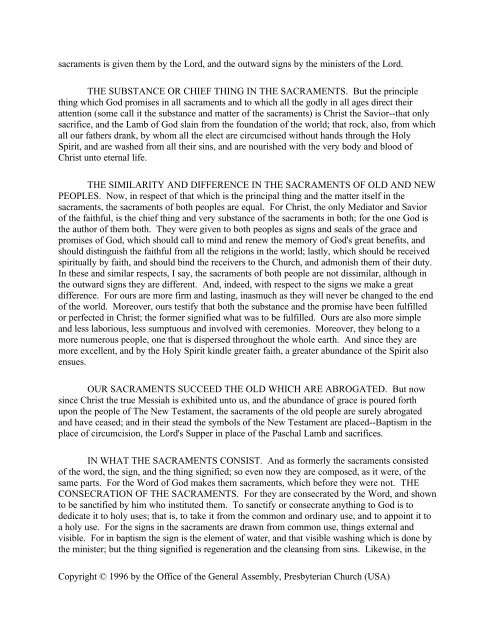The Book of Confessions - The Presbyterian Leader
The Book of Confessions - The Presbyterian Leader
The Book of Confessions - The Presbyterian Leader
You also want an ePaper? Increase the reach of your titles
YUMPU automatically turns print PDFs into web optimized ePapers that Google loves.
sacraments is given them by the Lord, and the outward signs by the ministers <strong>of</strong> the Lord.<br />
THE SUBSTANCE OR CHIEF THING IN THE SACRAMENTS. But the principle<br />
thing which God promises in all sacraments and to which all the godly in all ages direct their<br />
attention (some call it the substance and matter <strong>of</strong> the sacraments) is Christ the Savior--that only<br />
sacrifice, and the Lamb <strong>of</strong> God slain from the foundation <strong>of</strong> the world; that rock, also, from which<br />
all our fathers drank, by whom all the elect are circumcised without hands through the Holy<br />
Spirit, and are washed from all their sins, and are nourished with the very body and blood <strong>of</strong><br />
Christ unto eternal life.<br />
THE SIMILARITY AND DIFFERENCE IN THE SACRAMENTS OF OLD AND NEW<br />
PEOPLES. Now, in respect <strong>of</strong> that which is the principal thing and the matter itself in the<br />
sacraments, the sacraments <strong>of</strong> both peoples are equal. For Christ, the only Mediator and Savior<br />
<strong>of</strong> the faithful, is the chief thing and very substance <strong>of</strong> the sacraments in both; for the one God is<br />
the author <strong>of</strong> them both. <strong>The</strong>y were given to both peoples as signs and seals <strong>of</strong> the grace and<br />
promises <strong>of</strong> God, which should call to mind and renew the memory <strong>of</strong> God's great benefits, and<br />
should distinguish the faithful from all the religions in the world; lastly, which should be received<br />
spiritually by faith, and should bind the receivers to the Church, and admonish them <strong>of</strong> their duty.<br />
In these and similar respects, I say, the sacraments <strong>of</strong> both people are not dissimilar, although in<br />
the outward signs they are different. And, indeed, with respect to the signs we make a great<br />
difference. For ours are more firm and lasting, inasmuch as they will never be changed to the end<br />
<strong>of</strong> the world. Moreover, ours testify that both the substance and the promise have been fulfilled<br />
or perfected in Christ; the former signified what was to be fulfilled. Ours are also more simple<br />
and less laborious, less sumptuous and involved with ceremonies. Moreover, they belong to a<br />
more numerous people, one that is dispersed throughout the whole earth. And since they are<br />
more excellent, and by the Holy Spirit kindle greater faith, a greater abundance <strong>of</strong> the Spirit also<br />
ensues.<br />
OUR SACRAMENTS SUCCEED THE OLD WHICH ARE ABROGATED. But now<br />
since Christ the true Messiah is exhibited unto us, and the abundance <strong>of</strong> grace is poured forth<br />
upon the people <strong>of</strong> <strong>The</strong> New Testament, the sacraments <strong>of</strong> the old people are surely abrogated<br />
and have ceased; and in their stead the symbols <strong>of</strong> the New Testament are placed--Baptism in the<br />
place <strong>of</strong> circumcision, the Lord's Supper in place <strong>of</strong> the Paschal Lamb and sacrifices.<br />
IN WHAT THE SACRAMENTS CONSIST. And as formerly the sacraments consisted<br />
<strong>of</strong> the word, the sign, and the thing signified; so even now they are composed, as it were, <strong>of</strong> the<br />
same parts. For the Word <strong>of</strong> God makes them sacraments, which before they were not. THE<br />
CONSECRATION OF THE SACRAMENTS. For they are consecrated by the Word, and shown<br />
to be sanctified by him who instituted them. To sanctify or consecrate anything to God is to<br />
dedicate it to holy uses; that is, to take it from the common and ordinary use, and to appoint it to<br />
a holy use. For the signs in the sacraments are drawn from common use, things external and<br />
visible. For in baptism the sign is the element <strong>of</strong> water, and that visible washing which is done by<br />
the minister; but the thing signified is regeneration and the cleansing from sins. Likewise, in the<br />
Copyright © 1996 by the Office <strong>of</strong> the General Assembly, <strong>Presbyterian</strong> Church (USA)




